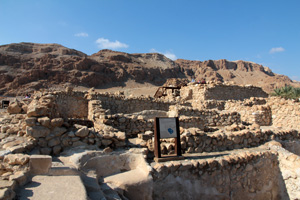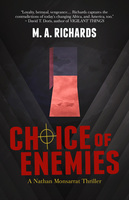 Qumran (Source: Israel National Parks) Qumran (Source: Israel National Parks) Research is such a Siren… Okay, I’ve never lashed my body to a mast and filled my ears with beeswax before firing up the laptop (in the old days, it was easier to build dramatic tension if you were striding up the stairs toward the wooden doors guarding the entrance to your local library, like hometown cousins of Scylla and Charybdis), but I have thrown myself off a cliff into the adventure of discovery – sometimes just for the sake of learning! I’m not talking about looking for relevant statistics for Professor Cudlip’s “Theory of Infinity” course, either. I’m talking about feeling the burn in your frontal lobes, counting your pulse up to 200-plus beats per minute, experiencing the joys of carpopedal spasms. There’s something forbidden, even illicit, about digging into history. You might know where you will start your explorations, but you have no idea where you will end up. Perhaps I’m a voyeur by nature…or an eavesdropper…or just a busybody, but the headlines of 2016 (ISIS, Republicans, North Korea, Wall Street), in my opinion, pale beside the questions lurking in the shadows of history (Did Oswald act alone? Did FDR know the Japanese plans to bomb Pearl Harbor? Did Stalin poison Lenin?) Or perhaps I’m a conspiracy theorist… I know for sure that I am a schizophrenic. I must be…I write under two names. M. A. Richards is the author of a spy novel series featuring Nathan Monsarrat, a former deep cover operative with the CIA – the first novel, CHOICE OF ENEMIES, launched in January 2016 while the second offering, A THOUSAND ENEMIES, will be available in November 2016 (both published by Sunbury Press). I also scribe historical fiction as A. M. ben Yitzhak. Currently, I’m conducting research on the Zealots, the group of breakaway radicals who fled Jerusalem during the Roman rule of the Second Temple Period to live a more pure life in the barren Judean wilderness…and fought the Empire to a standstill from 66 to 132 AD, when the last of the Zealots, led by Shimon bar Kochba, bled to death in the desert south of the Dead Sea. To conduct historical research on a secretive group that lived two thousand years ago demands familiarity with the writings of the period…so, you need (1) access to the original materials (if you ever ask the Israel Museum to borrow the original – not digital - Dead Sea Scrolls for a few days, you’ll hear a really rich laugh) and (2) you need to read Latin, Accadian, Aramaic, and a few other “dead” languages. I suppose you could trust someone else’s translations, but then you are dependent on someone else… There is another roadblock, which might be a blessing, the more I think about it: so few original texts were written two thousand years ago. I can rely on the aforementioned Dead Sea Scrolls, Josephus, and other apocryphal writings (e.g., the minor prophets), but the scholarship of this period is severely limited and, unless you’re on a first name basis with the Witch of Endor, it would be tough to interview Judas of Gamala, Simon bar Giora, Menahem ben Judah or any of the other original kana’im and siqari’im – the founders of the Zealots. A third difficulty refers back to the opening of this epic…research is such a Siren! It’s addictive! Impossible to stop! I can’t tell you how many times I shut down the stacks in local and university libraries. At least, the internet never sleeps, but unless you induct your spouse into the Eleusinian Mysteries, chances are good that the time you spend researching the daily habits of the Zealots will do nothing for your marriage and family life. Faced with so many challenges, what’s a historical novelist to do (and I’m not talking about agents and editors shaking their heads and informing you that the market for Zealot fiction is incredibly, infinitesimally tiny)? Travel! Read the State Department warnings…and ignore them. Listen to your family and friends…and ignore them. Read the newspapers and watch the twenty-four cable stations…and ignore them! You wanna write about the Zealots? Go to their home. Stomp around their ancient stomping grounds. You probably will not discover a missing cache of Dead Sea Scrolls in the unexplored caves of Qumran, but you will absorb the zeitgeist of the period as you stumble over sandstone boulders, tread on red desert poppies, and quaff liter after liter of tepid water beneath the broiling desert sun. You don’t have to go the fully Monty, either…you can sleep not in a tent beneath clear, star filled skies but in an air conditioned hostel that offers hot showers and a fantastic breakfast of yoghurt, cheese, olives, bread, fruit, and vegetables. After a few weeks of following in the footsteps of the Zealots, you will have collected enough ambiance to fill the pages of a historical novel and a wonderful appreciation for the amenities of the twenty-first century. When you’re back home, having made amends with your spouse, family, and employer, when you’re sitting in front of your laptop with English translations of Josephus and the Dead Sea Scrolls piled on your desk, when you launch your fingers against the monolithic blank digital page…you will always have your best ally by your side: your imagination. After all – it’s not history. It’s historical fiction.  M. A. Richards is the author of the Nathan Monsarrat international espionage novels. Born in Lowell, Massachusetts, he received his Bachelor of Arts degree in Theater Studies from Connecticut College and his Master of Arts degree in English from the University of Massachusetts at Amherst. During a career as a Cultural Attaché in the Department of State that spanned more than two decades, he served in Baghdad, Jerusalem, Lagos, Moscow, Seoul, Tel Aviv, and Washington, D.C. He also served at U.S. Pacific Command in Honolulu as the Special Advisor to the Commander. He speaks Arabic, Hebrew, Korean, and Russian. M. A. divides his time between Palm Beach and Tel Aviv, where he indulges his passions for motorcycles, photography, and archaeology. Visit www.MARichardsBooks.com to learn more about M. A. Richards and CHOICE OF ENEMIES.
1 Comment
4/18/2016 04:45:39 am
You are a better man than I, Michael. I admire your approach, and eye for detail. Me, I steer clear of this stuff till my back is against the wall, and what I've made up is so clearly not cutting it, you could sink the scene like a stone. I'll come back to your inspiring words when that happens!
Reply
Leave a Reply. |
Susanna CalkinsHistorian. Mystery writer. Researcher. Teacher. Occasional blogger. Categories
All
Archives
May 2023
|

 RSS Feed
RSS Feed